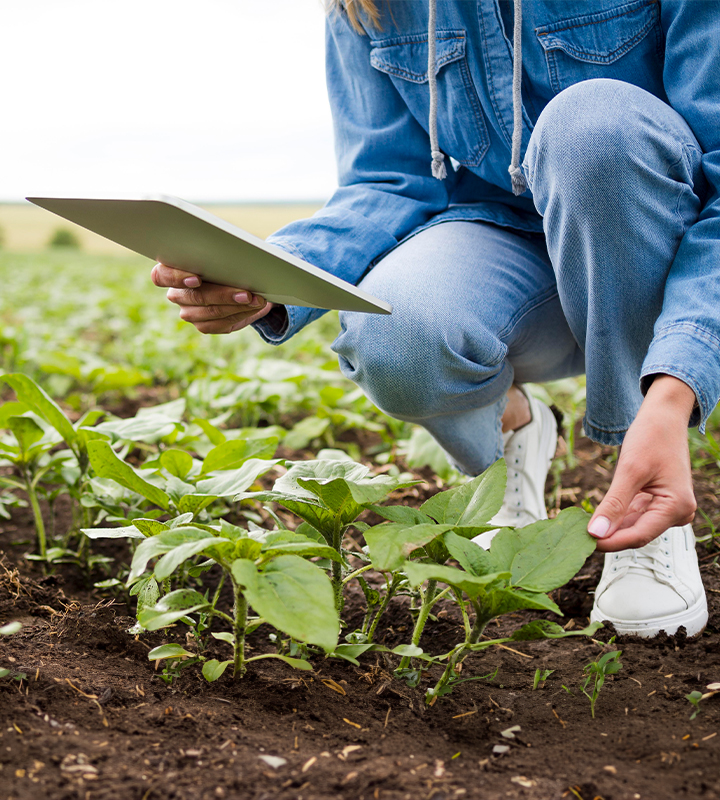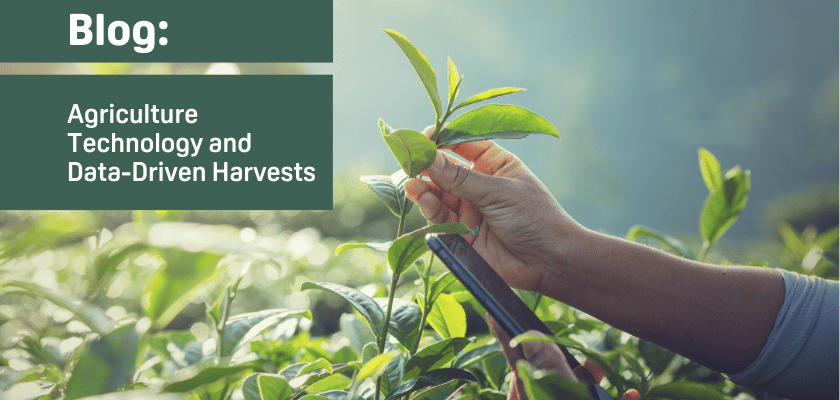

How Technology Revolutionized Farming
The technology transforming agriculture has significantly shaped our world with recent developments in the agricultural sector. The rise of digital farming and the integration of new technologies into agriculture have empowered farmers in terms of efficiency, productivity, and sustainability. Technological advancements are shaping the future of agriculture in terms of efficiency, sustainability, and resilience.
Published on 05 January 2024
New farming advancements have played a crucial role in shaping our world, with agriculture being a key sector undergoing significant transformation.
The rise of digital farming and the incorporation of new technology in agriculture have empowered farmers to enhance their efficiency, productivity, and sustainability.
Let's delve into how these innovations improved agriculture.
A Look at Its Impact on Agriculture:
- Mechanization: The Birth of Farm Machinery: One of the most significant advancements in farming technology was the development of farm machinery. Before the industrial revolution, farming was labor-intensive and relied on manual tools. With the invention of the plow, seed drill, and eventually tractors, farmers could cover more land, plant crops more efficiently, and harvest larger yields. Mechanization reduced the physical burden on farmers and allowed for larger-scale farming operations.
- Precision Agriculture: Optimizing Resource Use: Modern technology has introduced precision agriculture, which involves using data-driven insights to make informed decisions about farming practices. GPS technology, satellite imagery, drone technology, IoT in agriculture and agriculture sensors help farmers precisely measure and manage factors like irrigation, fertilization, crop health, and pest control. Doktar's innovative solutions contribute significantly to this precision farming approach. With products such as Orbit, a field scouting app utilizing satellite-based remote sensing, farmers can monitor crops in real-time and make data-backed decisions. Filiz, an IoT Sensor Station, aids in monitoring soil and weather conditions, offering tailored recommendations for optimizing irrigation, managing disease and frost risk, and making informed spraying decisions. Meanwhile, PestTrap, an IoT pest-tracking station employing machine learning, identifies and counts pests in real-time, optimizing crop yields and reducing the economic impact of pest-related damage. SoilScanner, a digital soil analysis device, ensures optimal soil health by providing instant nutrient analysis and generating personalized fertilization programs, contributing to higher yields. These solutions enable farmers to target specific areas in their fields, leading to more efficient resource use and improved sustainability.
- Biotechnology and Genetic Engineering: Advancements in biotechnology have revolutionized crop breeding and genetic engineering. Genetically modified crops have been developed to resist pests, diseases, and adverse weather conditions, increasing crop yields and reducing reliance on chemical pesticides. Biotechnology has also allowed for the creation of drought-resistant crops, helping farmers in regions prone to water scarcity to maintain productivity.
- Digital Farm Management: Smart Farming: The digital revolution has brought smart farming to the forefront. Farmers can now monitor their operations remotely through smartphones and connected devices. One of Doktar’s innovative solutions; Orbit, a field scouting app utilizing satellite-based remote sensing, farmers can monitor crops in real-time and make data-backed decisions. Also, with Field Flow, a web platform centralizing farming operations, streamlines activities with real-time notifications and recommendations. It tracks crop cultivation areas, offering historical data analysis for optimal crop selection and farming strategy. The data generated by these technologies helps farmers make timely decisions, from adjusting irrigation schedules to identifying disease outbreaks. All contribute to higher yields and lower costs.
Modern Farming vs. Traditional Farming: Embracing the Future of Agriculture
The age-old debate between traditional farming and modern farming methods continues to shape the future of agriculture. While traditional practices have a rich history deeply ingrained in our agricultural heritage, modern farming has emerged as a transformative force in the industry.
Modern farming, often referred to as "smart farming" or "precision agriculture," offers a range of advantages that make it a compelling choice for the future of agriculture.
The reasons why modern farming is considered superior to traditional farming practices:
- Efficiency and Productivity: One of the most apparent benefits of modern farming is the significant increase in efficiency and productivity it brings to the table. Traditional farming techniques often rely on manual labor and guesswork. In contrast, modern farming harnesses technology-driven data collection and analysis to make informed decisions. Precision agriculture enables farmers to optimize resource usage, leading to higher crop yields and lower resource wastage. This enhanced efficiency not only benefits the farmers themselves but also plays a crucial role in global food security.
- Sustainability and Environmental Impact: Modern farming is inherently more sustainable and environmentally friendly than traditional farming. It allows for the precise management of resources such as water, fertilizers, and pesticides, reducing their overuse and negative environmental effects. Precision agriculture minimizes soil erosion, conserves water resources, and decreases the need for chemical inputs, ultimately contributing to a healthier planet.
- Data-Driven Decision Making: Modern farming relies on data as its foundation. Through technologies like satellite imagery, weather forecasts, soil sensors, and GPS, farmers can access a wealth of information about their fields in real time. This data-driven approach enables them to make informed decisions about planting, irrigation, pest control, and harvesting. By understanding their fields' specific needs, farmers can optimize their operations, resulting in higher-quality crops and increased profitability.
- Cost Reduction: While the initial investment in modern farming technology may seem daunting, it ultimately leads to cost savings in the long run. By accurately managing resources and reducing waste, farmers can lower their input costs, which can be a significant portion of their overall expenses. This cost reduction not only improves the bottom line for individual farmers but also contributes to more competitive and sustainable agriculture on a larger scale.
- Greater Resilience to Climate Change: Climate change poses a substantial threat to global agriculture. Modern farming practices, with their focus on adaptability and data-driven decision-making, offer greater resilience in the face of changing weather patterns. Farmers can adjust their practices based on climate projections, making it possible to switch to more suitable crops or adapt irrigation schedules to mitigate the impact of extreme weather events.
Technology's transformative influence on agriculture, epitomized by Doktar's innovative solutions, has propelled farming into a future marked by efficiency, sustainability, and resilience. The advantages of modern farming, including increased productivity, data-driven decision-making, cost reduction, and climate resilience, position it as the unequivocal path forward.
For those interested in exploring how Doktar's innovative solutions can transform your agricultural practices, visit our website for detailed information on all our products. Stay updated with the latest developments by following us on Instagram and LinkedIn, where we share insights, tips, and updates about our technologies and their impact on modern farming.

Agriculture Technology and Data-Driven Harvests
The convergence of agriculture technology and data-driven solutions represents the next frontier of innovation in farming. With companies like Doktar leading the way, farmers can leverage these advancements to improve productivity, reduce environmental impact, and secure a more sustainable future for agriculture. Whether through precision agriculture, sustainable agriculture, or cutting-edge smart agriculture technology, the future of farming is bright, and data is at the heart of this transformation. Technology's positive impact on this future should inspire and motivate us all.

Integrating Crop Health Monitoring Systems for Better Farm Management
Crop health monitoring systems revolutionize modern agriculture by enabling real-time insights into plant health, reducing losses, and promoting sustainability. Tools like Doktar’s CropMap and Orbit integrate advanced technologies, empowering farmers with data-driven decisions. By enhancing efficiency and sustainability, these systems are essential for future-proofing agricultural operations.

Modern Agriculture: Innovative Solutions to Combat Global Food Insecurity
Modern agriculture combats global food insecurity with precision agriculture, sustainable practices, and biotechnology. Tools like IoT, automation, and crop innovations optimize resource use, enhance resilience, and ensure stable food supplies. By integrating smart technologies, agribusinesses address challenges like climate change and resource scarcity, paving the way for a sustainable food future.
